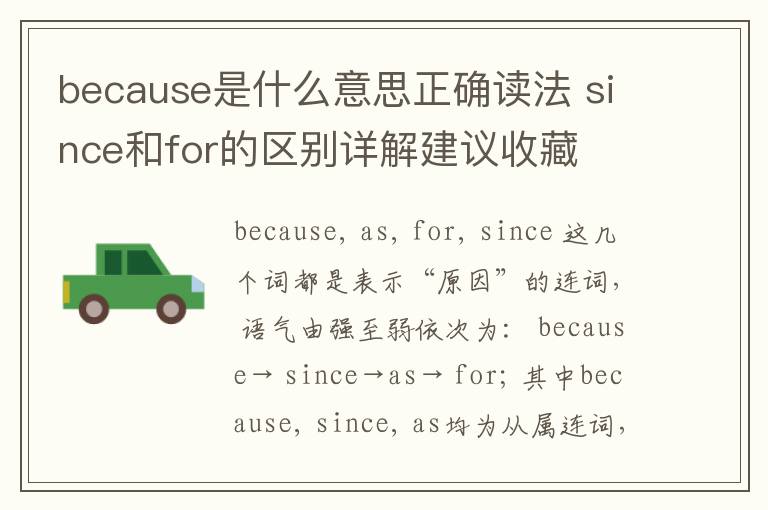
because, as, for, since 这几个词都是表示“原因”的连词, 语气由强至弱依次为: because→ since→as→ for; 其中because, since, as均为从属连词,引导原因状语从句;而for 是并列连词,引导并列句。
1、because:
(1)意思是“因为”,强调直接的原因,它所指的原因通常是听话人所不知道的,其语气最强,常用来回答why 的提问
I stayed at home because it rained. 因为下雨我呆在家里。
(2)回答why的提问时,只能用because,不能用其它几个词。
-Why were you late for school this morning?今天早上你上学为什么迟到?
-Because I missed the bus.因为我没赶上公交车。
(3)because一般放于主句之后,即:先结果,后原因,两句话的中间不用逗号分开。
①Because she was ill, she didn‘t come to school. 因为她生病了,没有上学。(错误)
②She didn’t come to school because she was ill. 她没上学,因为她生病了。(正确)
(4)because在回答别人的问题时,可以单独存在而不用主句。
-Why is she absent? 她为什么缺席?
-Because she is sick. 因为她病了。(没有主句)
(5)在强调句型中,只能用because,而不能用其它几个词:
It was because I missed the early busthat I was late for school. 我上学迟到是因为我没有赶上早班汽车。
(6)because不能与so连用:
BecauseTom got up late, sohe was late for school. 因为汤姆起床晚了,所以他上学迟到了。(错误)
Because的原因不能放在结果前,所以上面这一句应该去掉because.
2、since:
(1)意思是“既然”,表示明显的或已为人所知的理由,语气比because稍弱。
Since everyone is here, let‘s start. 既然大家都到齐了,我们就出发吧!
(2)它通常置于句首,侧重强调结果。
①Since you are unable to answer, perhaps we should ask someone else.
既然你回答不了,那我们也许该问问别人。(正确)
②Perhaps we should ask someone else since you are unable to answer. (错误)
3、as:
(1)意思是“由于,鉴于”,它表示的原因是双方已知的事实或显而易见的原因,或者理由不是很重要,语气比since更弱。
We all like her as she is kind. 由于她善良,我们都喜欢她。
(2)原因既可在前,也可在后:
As I had a cold, I was absent from school. 由于我感冒了,所以没去上课。
4、for:
(1)意思是“因为”,与because相同, 但它不表示直接原因,而是表明附加或推断的理由。
The days are short, for it is now December. 白天短了,因为现在已是十二月份。
(2)它引起的原因也只能放在句子后部,并且前后两个分句间用逗号隔开,for不可置于句首:
①It must have rained,for the ground is wet. (从地面潮湿作出下过雨的推测,但地湿并不一定是下雨所致, for不可以换为because)
②The ground is wet because it has rained. (下雨是地上潮湿的直接原因)